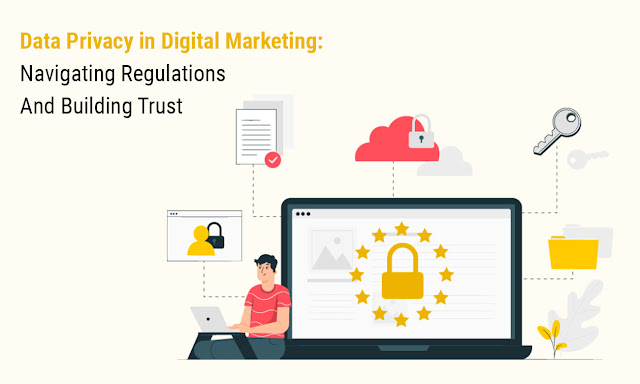Data Privacy in Digital Marketing: Navigating Regulations and Building Trust
Digital marketing has evolved significantly, with data privacy compliance becoming a crucial aspect of engagement. The digital ecosystem has become a dynamic arena where consumer data is the foundation of marketing strategies. This evolution is deeply intertwined with growing concerns and regulatory measures surrounding data privacy. Regulatory frameworks like the General Data Protection Regulation (GDPR) and the California Consumer Privacy Act (CCPA) have redefined the rules of engagement for businesses, emphasizing the need for stringent data handling practices. Trust is at the heart of this discussion, as it forms the foundation of enduring relationships between businesses and their audience. As data becomes an integral currency in the digital marketplace, trust is crucial for forging lasting connections and loyalty. Therefore, understanding, respecting, and safeguarding user data privacy is not just a regulatory requirement; it's a fundamental component of cultivating trust and fostering enduring relationships with their audience.
Understanding Data Privacy Regulations
Data privacy regulations have significantly impacted businesses worldwide, with the General Data Protection Regulation (GDPR) and California Consumer Privacy Act (CCPA) setting stringent standards for data protection and privacy across the EU and EEA. These regulations have led to a reevaluation of digital marketing strategies, requiring businesses to revisit data collection, storage, and processing methods. Compliance mandates have necessitated a profound recalibration of audience engagement approaches, impacting how data is collected, utilized, and safeguarded.
The enforcement of these regulations has necessitated a fundamental overhaul in data handling practices, with core concepts such as user consent, data transparency, and the right to erasure becoming pivotal compliance pillars. Marketers worldwide are reorienting data processing workflows to align with stringent guidelines, ensuring user privacy protection regardless of geographical boundaries.
Global compliance challenges for marketers include complexities surrounding consent management, data governance, and cybersecurity, as well as maintaining compliance amidst evolving technologies and cross-border data flows. Balancing compliance with effective audience engagement strategies across diverse markets adds layers of complexity to the already intricate data management process. In essence, while these regulations aim to fortify data privacy for consumers globally, they present a complex puzzle for marketers operating on an international scale.
Strategies for Ensuring Data Privacy Compliance
Data privacy compliance is crucial for businesses to build trust and ensure the protection of their users' information. Transparent data collection practices, such as being transparent about the data collected and its usage, are essential for ethical data handling. Businesses should prioritize transparency at every stage of data collection, ensuring users understand and consent to their information. Clear and concise privacy policies on websites or applications play a pivotal role in building trust.
Effective consent mechanisms are essential for data privacy compliance. Businesses should adopt best practices for obtaining informed consent, ensuring it is freely given, specific, and unambiguous. Granular consent options, allowing users to choose which specific data they are comfortable sharing, empower them and demonstrate a commitment to their privacy preferences. Providing simple and user-friendly options for users to revoke or modify their consent ensures ongoing compliance and respects their autonomy over their data.
Robust data security measures are also crucial for data privacy compliance. Encryption technologies, secure data storage protocols, regular security audits, and employee training on data protection practices are key components of an effective data security strategy. Emphasizing a culture of data security within the organization helps bolster overall data protection efforts.
Proactive compliance measures, such as regular audits and assessments of data handling practices, are also essential for ongoing compliance. By integrating these strategies into everyday practices, businesses can not only comply with regulations but also build and maintain trust with their audience by demonstrating a commitment to safeguarding their privacy.
Building Trust with Your Audience
Transparent communication is crucial for building trust in data handling. It involves outlining how user data is collected, processed, and utilized. Businesses should ensure their privacy policies are easily accessible and comprehensive, with regular updates and notifications. Educating the audience about their data rights and privacy measures is essential, with user-friendly guides and interactive tutorials. Balancing personalization and privacy is crucial, with businesses adopting privacy-first approaches and allowing users to control their level of personalization. Empathy and responsiveness are also essential in building trust. Being responsive to user queries, promptly addressing concerns, and providing accessible avenues for users to voice their privacy-related issues or opt out of certain data practices demonstrate a commitment to privacy and build credibility. By empowering users with knowledge and control over their data and consistently demonstrating respect for their privacy preferences, businesses can establish and nurture enduring trust-based relationships with their audience.
Leveraging Privacy Compliance as a Competitive Advantage
Privacy compliance is not just a legal obligation but also an opportunity to enhance a brand's reputation and credibility. A commitment to strict data protection measures signals trustworthiness, ethical conduct, and a genuine concern for user welfare, fostering a positive brand image, solidifying credibility, and fostering long-term loyalty. Businesses that invest in robust data protection measures and transparent communication set themselves apart, attracting privacy-conscious consumers seeking trustworthy brands. A customer-centric approach to data privacy can be a powerful selling point, as businesses that prioritize user control, transparency, and active involvement in data decisions resonate deeply with customers, leading to enhanced satisfaction and loyalty. Effectively communicating these principles through marketing channels can showcase a brand's commitment to data privacy, attracting like-minded consumers and reinforcing its identity as a trustworthy, ethical entity in the marketplace.
Communicating these principles effectively through marketing channels provides an opportunity to showcase a brand's commitment to data privacy. Crafting messages that highlight ethical practices, user empowerment, and a customer-first attitude can resonate strongly with privacy-conscious consumers, attracting like-minded consumers and reinforcing the brand's identity as a trustworthy, ethical entity in the marketplace.
Looking Ahead: Future Trends in Data Privacy
Emerging technologies like AI, IoT, and blockchain are revolutionizing data collection, storage, and utilization, but also presenting unique challenges to data privacy. AI enables advanced data analytics and personalization but raises concerns about automated decision-making and potential biases in data processing. IoT devices create vast amounts of sensitive data, necessitating stringent security measures. Blockchain technology holds promise in securing data through decentralized storage but requires careful navigation of regulatory compliance and user rights within decentralized networks. As these technologies evolve, future data privacy regulations will focus on adapting to their intricacies, necessitating agile frameworks capable of addressing these innovations' challenges while fostering innovation and consumer protection.
Ethical considerations in data usage are becoming increasingly pivotal, with issues surrounding consent, data ownership, algorithmic biases, and the ethical use of data at the forefront of discussions. Ensuring ethical data practices involves not only complying with regulations but also considering the broader societal impact of data usage. Striking a balance between innovation and ethical responsibility requires businesses to embed ethical considerations into their decision-making processes, including transparent communication about data usage, fairness in data processing, and inclusivity and diversity in datasets to mitigate biases. The future trends in data privacy will be shaped by the interplay between emerging technologies and ethical considerations, necessitating not only compliance with regulations but also a proactive commitment to ethical data practices that prioritize user rights, fairness, and societal impact.
Data privacy is crucial in the digital landscape, as it is the foundation of trust, ethical conduct, and brand credibility. It is not just a legal requirement but a cornerstone for building enduring relationships with your audience. Transparent communication, robust compliance measures, and ethical data practices foster trust, fostering loyal customer relationships. Businesses should prioritize data privacy not just as a compliance requirement but as a fundamental commitment to their audience. Embracing transparency in data practices, educating users about their rights, and championing ethical considerations in data-related decisions are essential steps towards a future where innovation thrives harmoniously with ethical considerations. By staying ahead, being proactive, and demonstrating a steadfast commitment to user privacy, businesses can distinguish themselves and carve a distinct identity rooted in trust, integrity, and ethical conduct.



Comments
Post a Comment